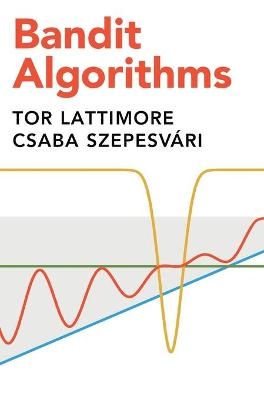
Bandit Algorithms
Cambridge University Press (Verlag)
978-1-108-48682-8 (ISBN)
Decision-making in the face of uncertainty is a significant challenge in machine learning, and the multi-armed bandit model is a commonly used framework to address it. This comprehensive and rigorous introduction to the multi-armed bandit problem examines all the major settings, including stochastic, adversarial, and Bayesian frameworks. A focus on both mathematical intuition and carefully worked proofs makes this an excellent reference for established researchers and a helpful resource for graduate students in computer science, engineering, statistics, applied mathematics and economics. Linear bandits receive special attention as one of the most useful models in applications, while other chapters are dedicated to combinatorial bandits, ranking, non-stationary problems, Thompson sampling and pure exploration. The book ends with a peek into the world beyond bandits with an introduction to partial monitoring and learning in Markov decision processes.
Tor Lattimore is a research scientist at DeepMind. His research is focused on decision making in the face of uncertainty, including bandit algorithms and reinforcement learning. Before joining DeepMind he was an assistant professor at Indiana University and a postdoctoral fellow at the University of Alberta. Csaba Szepesvári is a Professor in the Department of Computing Science at the University of Alberta and a Principal Investigator of the Alberta Machine Intelligence Institute. He also leads the 'Foundations' team at DeepMind. He has co-authored a book on nonlinear approximate adaptive controllers and authored a book on reinforcement learning, in addition to publishing over 200 journal and conference papers. He is an action editor of the Journal of Machine Learning Research.
1. Introduction; 2. Foundations of probability; 3. Stochastic processes and Markov chains; 4. Finite-armed stochastic bandits; 5. Concentration of measure; 6. The explore-then-commit algorithm; 7. The upper confidence bound algorithm; 8. The upper confidence bound algorithm: asymptotic optimality; 9. The upper confidence bound algorithm: minimax optimality; 10. The upper confidence bound algorithm: Bernoulli noise; 11. The Exp3 algorithm; 12. The Exp3-IX algorithm; 13. Lower bounds: basic ideas; 14. Foundations of information theory; 15. Minimax lower bounds; 16. Asymptotic and instance dependent lower bounds; 17. High probability lower bounds; 18. Contextual bandits; 19. Stochastic linear bandits; 20. Confidence bounds for least squares estimators; 21. Optimal design for least squares estimators; 22. Stochastic linear bandits with finitely many arms; 23. Stochastic linear bandits with sparsity; 24. Minimax lower bounds for stochastic linear bandits; 25. Asymptotic lower bounds for stochastic linear bandits; 26. Foundations of convex analysis; 27. Exp3 for adversarial linear bandits; 28. Follow the regularized leader and mirror descent; 29. The relation between adversarial and stochastic linear bandits; 30. Combinatorial bandits; 31. Non-stationary bandits; 32. Ranking; 33. Pure exploration; 34. Foundations of Bayesian learning; 35. Bayesian bandits; 36. Thompson sampling; 37. Partial monitoring; 38. Markov decision processes.
| Erscheinungsdatum | 17.07.2020 |
|---|---|
| Zusatzinfo | Worked examples or Exercises |
| Verlagsort | Cambridge |
| Sprache | englisch |
| Maße | 182 x 252 mm |
| Gewicht | 1070 g |
| Themenwelt | Informatik ► Theorie / Studium ► Algorithmen |
| Informatik ► Theorie / Studium ► Künstliche Intelligenz / Robotik | |
| Wirtschaft ► Volkswirtschaftslehre ► Mikroökonomie | |
| ISBN-10 | 1-108-48682-7 / 1108486827 |
| ISBN-13 | 978-1-108-48682-8 / 9781108486828 |
| Zustand | Neuware |
| Informationen gemäß Produktsicherheitsverordnung (GPSR) | |
| Haben Sie eine Frage zum Produkt? |
aus dem Bereich


